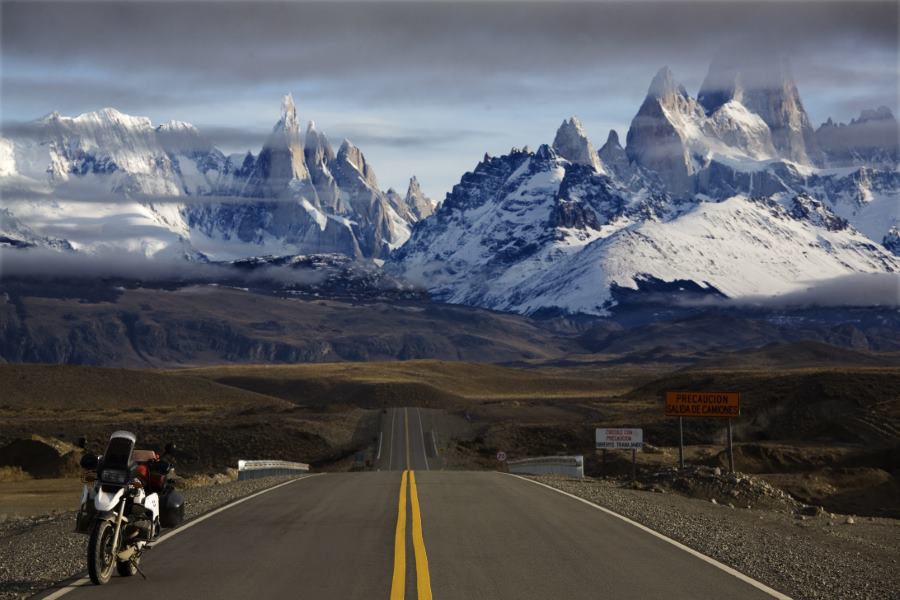I am writing this entry for my blog and also for the HUBB. I had spent many hours reading reviews of bikes, itineraries, tips and more and once or twice posted asking for advice. It is a wonderful place in many ways but I always ended up with the feeling that the bikes were more important than the places people went to. There is nothing fundamentally wrong with that but it is just not me. The bike is a means to an end for me. What's more, unlike many of the fine fellows on the HUBB, I had absolutely no meaningful mechanical experience and the idea of buying a huge bike, loading it with spares and somehow effecting roadside repairs was way beyond me. Also the thought of shipping, let alone re-assembling a bike at an airport leaves me cold. So for all those similarly inclined (or some might say impaired), here is my bike guide to travelling round West Africa if you don't want to spend a fortune on the bike, can't change a tyre and neither know nor care how much a BMW RS80 weighs.
Buy a local bike
I think Burkina used to make bikes but now a local bike means one made in China and sold in West Africa. There are essentially only three bikes in Mali, Senegal and Burkina (and a few more in Benin, Togo and I suppose Nigeria and Ghana). The first are fast Yamahas, but these are only for the police so they need not bother us. The second you'll see by the million in every city and everywhere with something approaching a road and that is a Jakarta or a Super K. It is a low powered moped and in skilful hands can get all kinds of places but it is painfully slow for longer distances and requires great skill to ride well in sand and on bad surfaces. The third comes by many, many names among them Sanili, Sanya and my own Super No. 1. It is normally a 125cc bike but a few like mine are in fact 150cc. It is capable of doing over a 100kph but tends to shake a lot after 90kph. It comes with city tyres, a cigarette lighter socket (Super No. 1 only) to make phone charging possible, a back rest for the passenger and decent sized rear foot rests. I paid about £450 for mine in Bamako. Mali is relatively cheap because the customs are less. Expect to pay about £100 more in Burkina or Senegal for example. Get a trusted local to help you and insist on getting proper documentation even if it costs more. You'll never get out of the country otherwise.
It and the legion of almost identical bikes is the only bike you'll see when the going gets rough and I can attest that it can handle deep sand, steep rocky inclines and anything else you are likely to encounter. Whether you the driver can handle them is of course another matter. My solution has been to go slow and keep slogging away until I have got through it. I am aware of other approaches and commend them to the more skilful drivers.
Modify it a little (by paying someone else to modify it)
The first thing you'll need and you will really need this is a knobbly back tyre. You could arrange this when you buy it so you can get something back on your unused back tyre or wait until you skid all over the place in the sand and fall off a few times like me before changing it. You won't pay more than £30 for it and you will never ever regret spending that money. You won't get a lot of extra benefit from changing the front one at the same time but it might be worth doing if you fancy it. It certainly looks cool.
Get that handy socket in use but buy the car charging attachments for your phone before you set off. My iPhone died while being charged so I can't rule out the possibility that the charger killed it so beware.
Following the advice of some of the HUBBsters, I bought a pair of canvas 1958 pattern army day sacks and strapped them to each other under the saddle to form a pair of handy panniers. Total cost £15. They have done sterling service but it does take ages to put them on and off again so I don't leave anything valuable in there.
Those with more ample arses may not have this problem but after a few hours I get really uncomfortable in the seat. My solution has been a deep lump of foam I use as a cushion. I am sure there are better solutions out there.
If I had known how quickly the chain would become loose and rattle, I would have bought a decent quality chain and had it fitted but there you go. Instead I have forked out 15p on many occasions while someone else did all the hard work tightening and ratcheting.
Mechanics for lazy idiots
This is how it works, you see something is not working. You pull into the little shed with a couple of lads pulling apart some ageing motorbike and they immediately fix your problem, you pay them anything from 15p to 50p for something more involved and off you go. What about parts? You don't need any, wherever you are, because your bike has exactly the same parts as everyone else's you can get what you need easily and quickly. A new indicator unit? £1.25, a new cable for the speedo? £1.25. Oil change? £3. A new chain? £3. A few spanners come in handy if you need to get the bags off and on again for a clean and a full set can be picked up for less than a tenner.
But what happens if you break down miles from anywhere? The next person you see will stop, tinker a bit and probably get you going and if they can't someone will lift your bike onto a truck or minibus and take it to the nearest village or town where it gets fixed. Or someone will call a mechanic and he'll come out to you and sort it there and then. In Africa lots of things don't work but the people are remarkably ingenious and should never be underestimated. Even when you think it is looking hopeless, someone will find a way, a way you would never have dreamed of most likely.
Myths
When the going gets tough only a big bike is going to get you out of trouble.
It may be true at extreme altitudes, in the deep desert or if you are idiotic enough to travel in the Congo during the rainy season. But quite frankly very little of Africa and none of west Africa is at an extreme altitude, Al Qaeda are more of a worry than underpowered bikes in the desert and only a lunatic would risk malaria and civil war to travel through central Africa in the rainy season. With my rudimentary but growing offroad skills I have handled some horrendous roads and seen more skilful riders do so at great speed. Spend some money on learning some skills and forget about what the bike can do.
Cheap Chinese bikes are unreliable
It's kind of true in the sense that things do fall off or break but that's true of any bike put through its paces. The difference is that repairs are a couple of quid and half an hour away. They do not involve leaving your bike and travelling hundreds of miles to a dealer who orders a part from Europe by courier at great cost and which no one has ever seen before let alone fitted properly when you finally get back to your defanged monster bike.
When you do get to a good road, you'll need the power to eat up those miles
This may for all I know be true in Southern Africa but here the roads are never that great and going more than 60mph is crazy because you have less time to deal with the next pothole, donkey wandering onto the road or lorry driving towards you on your side of the road to avoid a pothole on his. Take your time and enjoy the scenery, it is after all why you are here.
Anyway this post is for all those people who like me lurked on the HUBB and felt that somehow it was too hard, too expensive or too complicated for them to get on a bike and go. If i have one regret it is not doing an offroad course before leaving home as it's always better to make your mistakes on someone else's bike and with help at hand. The bike though I'd buy again and I honestly wouldn't swap it here for the top of the range BMW or Yamaha. But this is Africa and I still have lurking somewhere a plan to get a big bike and travel in South America, where I think it might make a lot more sense. But that's another story yet to be written.
Find my blog at
To Bamako and Beyond if you want to know how I got on





























 Hybrid Mode
Hybrid Mode









